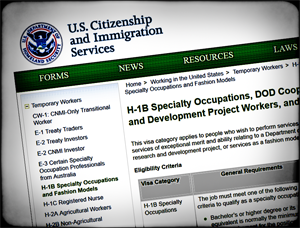The big H-1B employers in Silicon Valley took two unrelated and indirect hits recently.
The biggest damage came last week from a federal judge's decision in which H-1B was not even mentioned, but which cast dark shadows on the software industry's image as an employer.
The lesser blow came from a Department of Homeland Security move earlier that will decrease the number of H-1B slots available for computer programmers. In this action, the computer industry was not mentioned, but it will be hurt in any case.

The district court ruling found that Silicon Valley employers had been, according to the New York Times, "engaged in 'an overarching conspiracy' against its own employees." With those words, Judge Lucy H. Koh rejected a proposed settlement of a suit against the employers filed by 64,000 high-tech workers who claimed that their wages had been adversely affected by a conspiracy among the employers not to raid each other's staffs for talent.
The workers' (presumably now chagrined) lawyers had agreed to settle what had been claimed to be $3 billion in damages for $324 million, a quarter of which would have gone to the attorneys, but the judge rejected the settlement as inadequate, something judges rarely do.
If Bill Gates and his peers argue that they must ignore American workers in favor of the "best and brightest" among H-1B workers, how does that jibe with an unwillingness to recruit such able people from other firms? Are not the use of both the H-1B program and the non-raiding agreement indications of a determined effort to reduce wages?
Perhaps the case will go to trial, with the prospect of more airing of the tech industry's dirty laundry or, more likely, the settlement will be increased several times over.
Meanwhile, there was a far subtler action taken by DHS in the H-1B field. DHS recently announced a new policy memorandum regarding the employment of H-1B nurses. Now, every nurse employed through the program means that one computer programmer will not be hired because there is a ceiling of 85,000 on new H-1B slots each year. What the hospitals will gain, Silicon Valley will lose. It really is a zero-sum game.
In the past there was little use of the H-1 program to hire nurses except as teachers of nursing, as shown in the "Adam University" scandal of 2012. (For years the government allowed the hiring of "nursing instructors" for a non-existent university when, in fact, the women involved wound up working in nursing homes, as we reported earlier this year.)
More recently, the government has sensed what it sees as a trend in hospitals to hire more nurses with bachelor's degrees or more (which makes them eligible for H-1B, as less thoroughly educated nurses are not). And to facilitate such hiring DHS has reached out to health care employers by providing a new policy memorandum on the subject.
The projected indirect impact on the software industry is not, of course, mentioned, but maybe Computerworld, the industry's trade paper, will notice.
